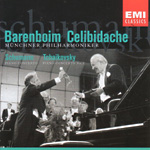The Barenboim/Celibidache combination proves a potent one in Schumann’s Piano Concerto. In the first movement Barenboim’s light touch and freely elastic rubato make for a distinctly poetic reading that is wholly in sync with Schumann’s romantic style. Barenboim is keenly attuned to the Intermezzo’s tranquil lyricism, but he summons tremendous sound from his instrument while displaying rhythmic vibrancy in the gallantly dancing finale. Celibidache’s conception is thankfully free of the massive sonorities and heavy tread found in many of his last symphonic recordings, and he provides a stirring and full-bodied accompaniment with the Munich Philharmonic.
After this, the Tchaikovsky performance disappoints. Celibidache’s grand opening holds promise, but Barenboim’s solo turn is barely launched before he starts self-consciously “interpreting” the music, going beyond mere rubato to employ drastic lurches and pauses and inserting all manner of sforzandos and diminuendos. As the performance progresses, Barenboim seems more interested in impressing us with his brilliant pianism than communicating the composer’s intent, so much so that by the development he’s got Tchaikovsky at times sounding like Scriabin and at others like Beethoven. The slowish Andante follows in this rather heavy-handed vein, while the finale runs a fairly normal course, except in the coda where Barenboim seems to lose his grip on those rapid closing runs. Celibidache’s blazing, blaring accompaniment suits his collaborator’s approach. Both recordings were made live, setting soloist and orchestra believably in a large, reverberant acoustic that gives the impression of sitting in a real hall, but also imparts a metallic edge to the piano sound.
































